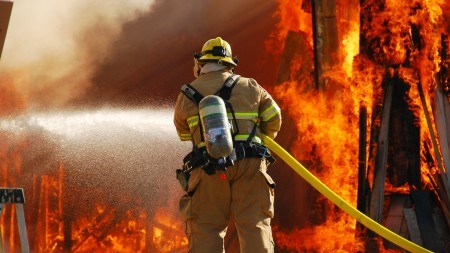When it comes to fire safety in the home, most of us have a pretty good idea of what is and isn’t dangerous (how many safety videos did it take for us to know NOT to walk away from a boiling pot on the stove or a burning candle!).
That said, fire hazards can sometimes be lurking in the least expected places, and often in plain sight! What’s worse, most fire hazards are easily avoidable if spotted and dealt with in time. With this in mind, here are 6 potential fire starters to take note of:
1. Excessive dust
In addition to wreaking havoc on our sinuses and the cause of what feels like a never-ending war against countertops and surfaces, a build-up of dust can become a potential cause of household fires if left unchecked. A pile-up of dust, especially around wall plugs, room heaters and electronic appliances, could be one small spark away from easily becoming a fire that quickly spreads to nearby furniture, curtains or carpeting so be sure to regularly clean, sweep and/or vacuum those hard to reach nooks and crannies!
Read more: 13 easy cleaning hacks for your home
2. Concealed wiring
While exposed electronic parts and wiring are an obvious fire hazard, most homeowners don’t give as much attention or consideration to the wiring that is often unseen or concealed behind walls or inside cupboards. Faulty wiring is one of the leading causes of house fires, especially in older homes, so it is imperative that regular inspections of your home’s electrical wiring be undertaken. It is also recommended that an inspection take place should you wish to add or remove any electrical fittings when renovating or making home adjustments. Furthermore, be sure to use a professional building service when renovating or making any structural changes to your home as they are less likely to accidentally hit any wiring and start a fire.
3. Stacks of paper
It goes without saying that paper is one of the quickest things to catch alight so keeping stacks of magazines, newspapers or even bills and receipts can be a recipe for disaster, especially if they are kept close to any appliances such as a heater. It’s therefore a far better option to go the digital route where possible. At least that way, you won’t have piles of potential kindling scattered around the house.
4. Laptops and chargers
Cheap electronics are perhaps one of the biggest culprits when it comes to potential fire hazards and budget chargers from unauthorised dealers are no exception. These, more often than not, will not have undergone extensive safety tests and are therefore more likely to overheat when left plugged in. To be safe, unplug your charger once you’re done with it or before you leave the house. On a similar note, it’s not advisable to leave your laptop on any potential flammable surface like your bed or couch as soft surfaces like these don’t allow proper airflow and ventilation into your machine and could therefore cause it to overheat. Rather, leave your laptop on a non-flammable surface, such as a countertop or desk.
5. Loose batteries
It may be surprising but keeping loose batteries in a drawer or throwing them in the bin is a potential house fire waiting to happen. While unlikely, there is a chance that any other metal objects in your junk drawer or bin can come into contact with the battery and cause a spark, especially if the battery is a 9-volt battery. That said, it’s far safer to keep all batteries in their packaging or cover their nodes with tape until needed or when discarding.
6. Glassware
Finally, it may seem far-fetched, but your glassware can be a potential fire hazard without you even realising it. Similar to how a magnifying glass can be used to focus light and start a fire (when desperate), your glassware can focus sunlight and cause a fire to start if, by fluke, the conditions perfectly line up. With that said, it’s advised that you keep any mirrors, crystal ornaments and even a fishbowl away from direct sunlight or sunny window ledges.
While it can be seen that a bit of common sense can protect your home from potential fire hazards, it is important to remain vigilant and stay educated about what less common household objects could be fire starters in disguise. It’s far better to take preventative measures rather than being lax and allowing a chance for everything to go up in smoke!
See more: Common household chemicals that are a fire safety risk



